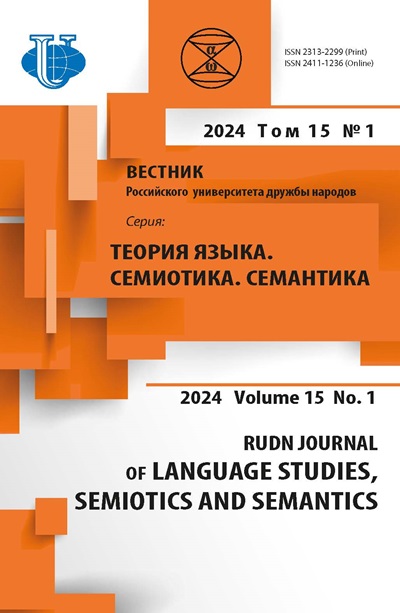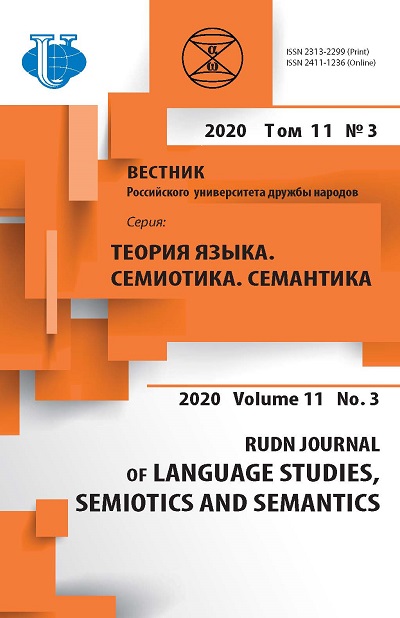The Specificity of Functioning of Winged Expressions in the Poetry of Dmitry Bykov
- Authors: Zykova E.I.1
-
Affiliations:
- St. Petersburg State University
- Issue: Vol 11, No 3 (2020)
- Pages: 463-478
- Section: COGNITIVE STUDIES IN LANGUAGE
- URL: https://journals.rudn.ru/semiotics-semantics/article/view/24600
- DOI: https://doi.org/10.22363/2313-2299-2020-11-3-463-478
Cite item
Full Text
Abstract
The article deals with the specific features of the functioning of winged expressions in the poetry of Dmitry Bykov. Analyzing the poetic work of Dmitry Lvovich Bykov, a modern Russian writer, poet, public figure, publicist, it is impossible not to notice that the poet uses a “winged” language arsenal in all its diversity. These are biblical winged words and quotations ( мафусаилов век, ищите и обрящете, геенна огненная ), quotations from works, Russian and European literature ( Через четыре года здесь будет город-сад! Прощай, свободная стихия! Офелия, О нимфа! Помяни грехи мои в молитвах! ), winged words, dating back to antiquity ( Жребий брошен! белая ворона ), quotes from modern and Soviet songs ( Я люблю тебя жизнь и надеюсь, что это взаимно! ). In addition, the question of the specific stylistic functions of winged expressions, which Dmitry Bykov uses in his poetry, is considered. Among the most significant and most frequent and expressive can be distinguished satirical and compositional functions. In Russia, Dmitry Bykov is known as a writer, a satirist poet, writing mainly on acute political and socially significant topics. Therefore, it is completely understandable why one of the favorite winged words functions that he uses is depathetic. An important artistic language means in D. Bykov’s poetic satire is his author’s transformations of winged expressions. In the poetry of Dmitry Bykov, you can find the use of almost the whole range of individual-author transformations. Both semantic and structural-semantic. Dmitry Bykov is a master of a deep, complex image. In his poems, he creates complex allegories, his images are metaphorical, full of sarcasm. And in order to reach this depth of the image, the author most often uses not one, but several methods of transforming winged words within one context, which is, in our opinion, another specific feature of the writer's artistic style.
About the authors
Elena I. Zykova
St. Petersburg State University
Author for correspondence.
Email: e.zikova@spbu.ru
Candidate of Philology, Associate Professor, Associate Professor of the Department of the Russian Language for the Humanities and Natural Sciences Faculties
11, University Embankment, St. Petersburg, Russian Federation, 199034References
- Syulegkova, S.G. (1995). Winged expressions of the Russian language, their sources and development. Chelyabinsk. (In Russ.).
- Dyadechko, L.P. (2002), Winged words as an object of linguistic description: history and modernity. Kiev. (In Russ.).
- Berkov, V.P., Mokienko, V.M. & Syulegkova, S.G. (2008—2009). A large dictionary of winged words and expressions of the Russian language. Vol. 1. А–M. (2008); Vol. 2. N–YA. (2009). Magnitogorsk—Greifswald. (In Russ.).
- Syulegkova, S.G. (2002). Winged expressions, their sources and development. Moskow. (In Russ.).
- Mokienko, V.M. (2003). Depatetization of patetism in the modern text In Modern language processes: interuniversity collection. St. Petersburg. (In Russ.).
- Zykova, E.I. (1997). Winged Expressions in the Works of V. Voinovich [dissertation]. St. Petersburg. (In Russ.).
- Mokienko, V.M. (2012). Phraseology and language game: dynamics of form and meaning. In: Scientific notes of the Vernadsky Tauride University. Series: Philology. Social communications, 25 (64) —2 (1)—1. (In Russ.).
- Melerovich, A.M. & Mokienko, V.M. (1997) Phraseologisms in Russian speech. Vocabulary. Moskow: Russian dictionaries. (In Russ.).
- Mokienko, V.M. (2003) Winged words as a linguistic phenomenon and as an object of learning RCTs. X Congress MAPRYAL. Vol. 3. St. Petersburg. рp. 161—169. (In Russ.).
- Melerovich, A.M., Mokienko, V.M. & Yakimov, A.Ya. (2016). Phraseologisms in Russian poetry of the 19th—21st centuries Dictionary: the experience of lexicographic systematization of the use of phraseological logisms in Russian poetry. Under the scientific, V.M. Mokienko (Ed.). Kostroma: Kostroma state. University. (In Russ.).
- Mokienko, V.M. & Sidorenko, K.P. (2017). Winged expressions, literary images and quotes from the fables of Ivan Andreevich Krylov. Moscow: Tsentrpoligraf. (In Russ.).
- Lomakina, O.V. (2018). Phraseology in the text: functioning and idiostyle: monograph., V.M. Mokienko (Ed.). Moscow: RUDN. (In Russ.).
- Mokienko, V.M. & Zykova, E.I. (2019). The school dictionary of winged words of the Russian language”as an object of lexicographic description. Questions of lexicography, 16, 153—163. (In Russ.).
- Zubova, L.V. (2000). Contemporary Russian poetry in the context of the history of language. Moscow: New Literary Association. (In Russ.).
- Shulezhkova, S.G. (2011). “And life, and tears, and love..”. The origin, meaning, fate of 1,500 winged words and expressions of the Russian language. Mosvow: Flinta: Nauka. (In Russ.).
- Zykova, E.I. (2017). Sustainable combinations in the modern Russian media text (based on the material of the language of the media and the Internet) In: Slavic phraseology in modern media (journalistic discourse). Collective monograph. Repl. ed. H. Walter, V. M. Mokienko, J. Fink. Greifswald. SPB — Zagreb. pp. 129—132. (In Russ.).
- Lomakina, O.V. & Mokienko, V.M. (2019). Wingfish in a modern cultural context. RUDN Journal of Language Studies, Semiotics and Semantics, 10 (2), 256—272. (In Russ.).
- Mokienko, V.M. (2018). Proverb in a poetic text. Life of phraseology — phraseology in life: a collection of scientific articles for the anniversary of Professor A.M. Melerovich / editor and comp. I.Yu. Tretyakov; foreword A.E. Yakimov. Kostroma: Publishing house Kostroma. state University. рp. 211—225. (In Russ.).
- Mokienko, V.M. (2018). Classics of Russian literature in the mirror of winged expressions (experience of lexicography). Education of Lugansk region. Theory and practice, 4, 2—5. (In Russ.).
- Mokienko, V.M. & Sidorenko, K.P. (2018). The winged words of fables by Ivan Andreevich Krylov. Dictionary. SPb: Publishing house of St. Petersburg University. (In Russ.).













